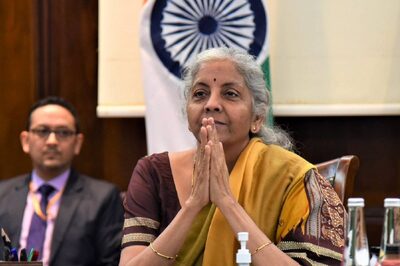
views
Hong Kong: Chinese viewers were the world's first to see The Da Vinci Code, the controversial tale that challenges a basic premise of Christianity.
A gala Beijing screening on Wednesday night upstaged the movie's high-profile opening at the Cannes Film Festival by about four hours, an action seen as underscoring China's importance to Hollywood as a potential new market of millions.
The film version of Dan Brown's murder mystery novel, based around the premise that Jesus Christ and one of his followers, Mary Magdalene, fathered children whose descendants are still alive, begins officially opening around the world Thursday.
Time zones will make Asian viewers the first mainstream audiences. The film has reignited a global row. Many Christians consider it blasphemous, demanding the book and film be banned.
In Asia, Christian leaders worry the movie may spread misinformation about their religion, a minority faith in a region dominated by Buddhism, Hinduism and Islam.
Christians in India, Malaysia, the Philippines, Singapore, South Korea and Thailand have either protested the film or expressed concern.
The release of the movie was postponed in India after a flood of complaints. In Mumbai, Joseph Dias, head of the Catholic Secular Forum, went on a hunger strike to protest the movie's planned release.
Information and Broadcasting Minister Priya Ranjan Dasmunsi watched the film on Wednesday, and said he found ''the movie as a fiction OK.'' Still, he said government censors would have to study some groups' objections. A decision could come early Friday.
In Rome, Opus Dei, the conservative Catholic movement depicted as a murderous cult in the book and film, hosted a daylong campaign to counter what it says is an offensive portrait of Christianity, the Catholic Church and Opus Dei itself.
''Soon this regrettable but fleeting episode will be forgotten,'' said Opus Dei spokesman Manuel Sanchez Hurtado. ''Let us hope that its lessons about mutual respect and understanding are not.''
The film got a somewhat poor response in Cannes, too, but for reasons more aesthetic than religious.
''Da Vinci never rises to the level of a guilty pleasure. Too much guilt. Not enough pleasure,'' wrote critic Kirk Honeycutt in the Hollywood Reporter newspaper.
PAGE_BREAK
Laughter rippled through the Cannes theater during a moment of ponderous melodrama in the film. From then on, critics who'd mostly been politely silent for more than two hours tittered during the final scenes.
Things were more serious in some Asian countries. ''If Jesus Christ had a child and a wife, then Christianity would be destroyed,'' said Thongchai Pradabchananurat, a Protestant leader in mostly Buddhist Thailand.
Thai lobbyists had initially persuaded censors to cut the film's final 10 minutes, but the censors reversed their position after Columbia Pictures appealed.
Authorities in Singapore and South Korea rejected calls to ban the film, saying audiences understand it is fictional.
In the largely Catholic Philippines, censor Marissa Laguardia said it's important to preserve free speech.
''Thirty-six countries have already reviewed this film, and they have not banned it,'' Laguardia said. ''So are we just out of the Stone Age?''
In mostly Muslim Malaysia, Bishop Lim Cheng Ean said the film wouldn't threaten Christians' belief.
''If Christians know their own faith, they will be strong enough,'' he said.
In China, with its atheistic communist government that regularly suppresses public debate on controversies, there has been little discussion on the film. Its usually strict censors cleared it with no cuts in March.
Beijing doesn't recognise the Vatican, which has criticized the movie. The film also triggered worries in predominantly Catholic Latin America. Venezuela's bishops' conference issued a statement Tuesday calling the film ''an attack on the fundamental beliefs and values of Christianity and the Catholic Church.''
Back in Cannes on Wednesday, director Ron Howard offered some advice to those who object to his film.
''There's no question that the film is likely to be upsetting to some people,'' Howard told reporters, adding that his advice was ''to not go see the movie if you think you're going to be upset.''



















Comments
0 comment